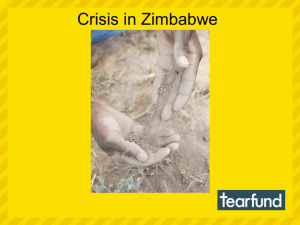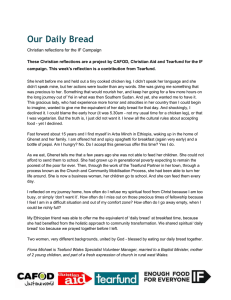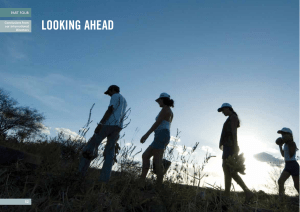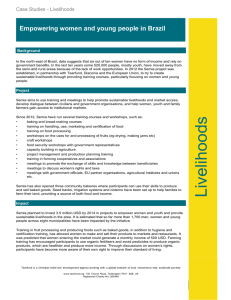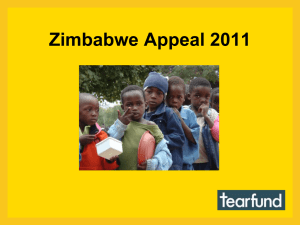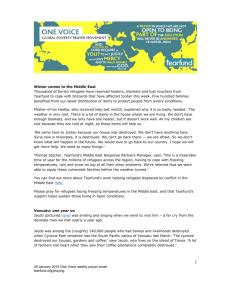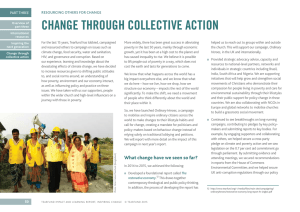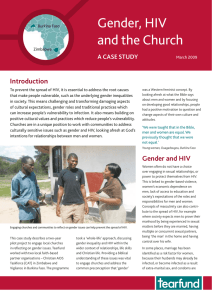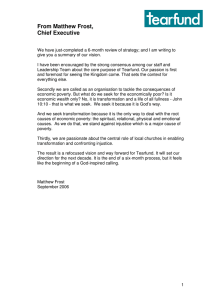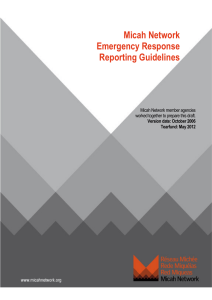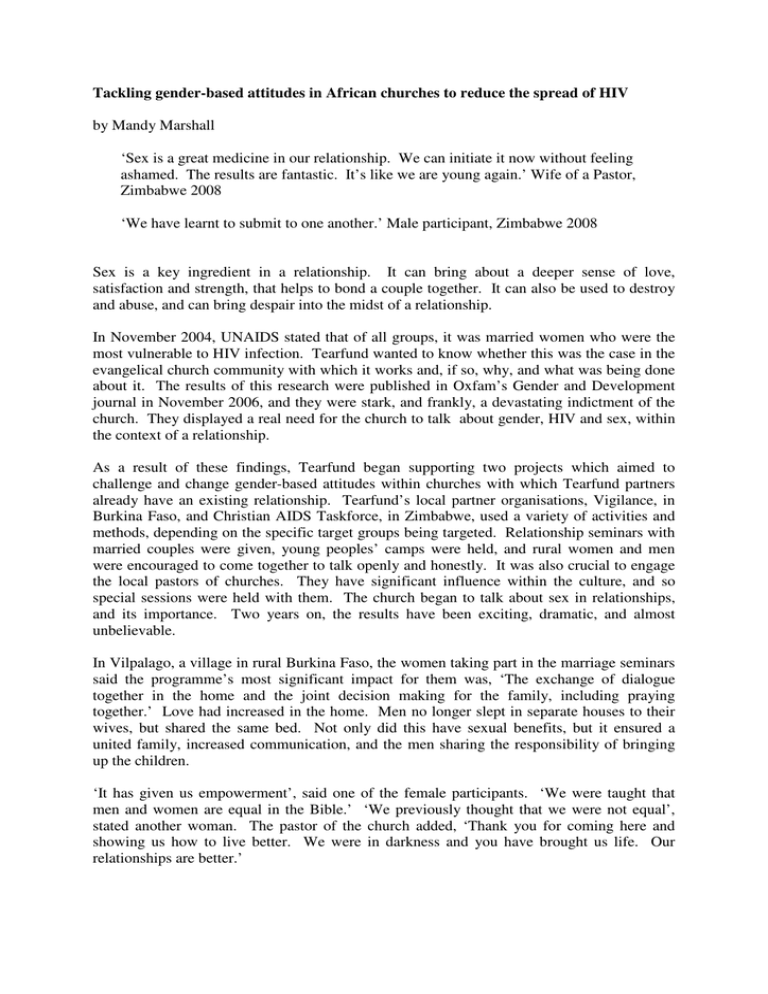
Tackling gender-based attitudes in African churches to reduce the spread of HIV
by Mandy Marshall
‘Sex is a great medicine in our relationship. We can initiate it now without feeling
ashamed. The results are fantastic. It’s like we are young again.’ Wife of a Pastor,
Zimbabwe 2008
‘We have learnt to submit to one another.’ Male participant, Zimbabwe 2008
Sex is a key ingredient in a relationship. It can bring about a deeper sense of love,
satisfaction and strength, that helps to bond a couple together. It can also be used to destroy
and abuse, and can bring despair into the midst of a relationship.
In November 2004, UNAIDS stated that of all groups, it was married women who were the
most vulnerable to HIV infection. Tearfund wanted to know whether this was the case in the
evangelical church community with which it works and, if so, why, and what was being done
about it. The results of this research were published in Oxfam’s Gender and Development
journal in November 2006, and they were stark, and frankly, a devastating indictment of the
church. They displayed a real need for the church to talk about gender, HIV and sex, within
the context of a relationship.
As a result of these findings, Tearfund began supporting two projects which aimed to
challenge and change gender-based attitudes within churches with which Tearfund partners
already have an existing relationship. Tearfund’s local partner organisations, Vigilance, in
Burkina Faso, and Christian AIDS Taskforce, in Zimbabwe, used a variety of activities and
methods, depending on the specific target groups being targeted. Relationship seminars with
married couples were given, young peoples’ camps were held, and rural women and men
were encouraged to come together to talk openly and honestly. It was also crucial to engage
the local pastors of churches. They have significant influence within the culture, and so
special sessions were held with them. The church began to talk about sex in relationships,
and its importance. Two years on, the results have been exciting, dramatic, and almost
unbelievable.
In Vilpalago, a village in rural Burkina Faso, the women taking part in the marriage seminars
said the programme’s most significant impact for them was, ‘The exchange of dialogue
together in the home and the joint decision making for the family, including praying
together.’ Love had increased in the home. Men no longer slept in separate houses to their
wives, but shared the same bed. Not only did this have sexual benefits, but it ensured a
united family, increased communication, and the men sharing the responsibility of bringing
up the children.
‘It has given us empowerment’, said one of the female participants. ‘We were taught that
men and women are equal in the Bible.’ ‘We previously thought that we were not equal’,
stated another woman. The pastor of the church added, ‘Thank you for coming here and
showing us how to live better. We were in darkness and you have brought us life. Our
relationships are better.’
[When we visited the project, the men served the women at lunchtime. It was the first time I
had ever witnessed such an act.]
In Ouagadougou, the church had brought together a group of young people who were trained
as HIV peer educators. They had a programme looking specifically at gender issues,
theology and HIV. At the end of the programme, we asked the young women (aged 15 – 25
years) what, for them, had been the most significant change. They agreed together that this
was a change of mentality. One young female participant said, ‘In the past we thought some
activities were only appropriate for men but now we know anyone can do it.’
The young men participating in the programme in Ouagadougou reported that they now
consider girls more than they used to, resulting in a big impact on their lives and the lives of
those around them. Although they are doing things that other boys their age don’t do, they
still do it because they can see the value.
In Zimbabwe, we saw similar radical changes taking place in people’s lives. Through simple
messages of restored relationships and relationship satisfaction, lives appear to have been
transformed. ‘My relationship with the family has changed. There is now forgiveness, love
and respect for them,’ said one male participant. ‘It has helped me deal with my pride, added
another. Women reported better relationships and a return to doing the intimate things in
marriage that they had stopped doing.
The young men and women also participated in the youth-focused programme, which raised
awareness of HIV and gender, the aim being the dignified and respectful treatment of each
individual. One young woman reported, ‘I used to think that it was alright in a love
relationship for a man to beat the wife. Now I know to report such incidents.’ One young
man confessed, ‘My eyes have been opened to the issues of abuse and I realise I am guilty of
abusing my friends and girlfriends.’ These amazing results have been achieved through basic
relationship education; asking questions such as what makes a relationship - what are the key
components? Communication, openness, trust, honesty, respect for each other, as well as
sexual satisfaction, are all important elements.
It should be relatively easy to replicate the success of these projects. It requires the provision
of a safe environment for couples and young people to talk openly about gender, sex, and
HIV, and needs an understanding of biblical perspectives on the relationship between men
and women, in order to be able to answer questions specific to the church’s context.
However, this can be kept as simple as ‘God created men and women equal’.
The church has a distinct role to play in restoring relationships. Tearfund and its partners
believe that churches working with those affected by HIV are able to reach the most
marginalised in the heart of poor communities, and are in a unique position to work with
those communities on issues such as stigma. This includes addressing the stigma placed on
certain behaviours that has emanated from within the churches themselves. It takes time,
patience, and the discussion of difficult issues. Although this process can be tough, the
restoration of good relationships that results is well worth the effort.
The next step for both these projects, besides securing further funding, is to expand into other
areas where the churches are now asking for this work to be done. The demand is high. For
example, the organisations involved want to begin to challenge the church more strongly on
gender-based violence, and to work with survivors of this violence, with the aim of breaking
the silence that currently exists around the subject.
There is still a lot of work to do. It requires each person, organisation, and institution, to play
their part in reaching the people and groups who will be open to hearing messages about
positive living. The church can play its part. The church needs to be included in the response
to HIV and AIDS, and should no longer be on the sidelines.
Mandy Marshall is gender advisor in the Programme Development Team at Tearfund,
email:mandy.marshall@tearfund.org.
Tearfund’s project partner in Zimbabwe is Christian AIDS Taskforce: Gender Project, 45
Heymean Road Suburbs, Bulawayo, Zimbabwe – contact Minenhle Moyo, email:
catfam@mweb.co.zw,
Tearfund’s project partner in Burkina Faso is Vigilance: 04 BP 8276 Ouagadougou 04,
Burkina Faso – contact Nikiema Kouliga Michel, email: vigi@fasonet.bf.
For more information on Tearfund’s work, see their website: www.tearfund.org

